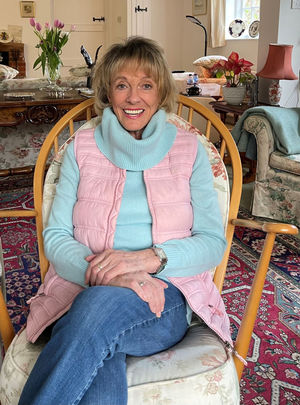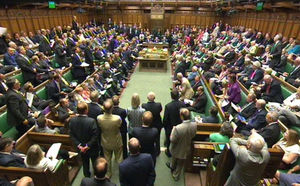All you need to know about Commons bid supported by Esther Rantzen on assisted dying law
Assisted dying is being discussed in the Commons for the first time in a decade.
Watch more of our videos on ShotsTV.com
and on Freeview 262 or Freely 565
Here are the facts you need to know:
THE CASE FOR ASSISTED DYING:
Assisted dying can be “carefully legalised”, Dame Esther Rantzen has said as she urged people to write to their MP as proposed legislation is brought before the Commons.

The Childline founder said she is writing to her own representative in Parliament to make her case for a change in the law, telling her story of terminal illness and a wish to have a choice over the end of her life. Dame Esther, who has stage four lung cancer, has been outspoken on the issue since revealing last December that she had joined Dignitas due to her fears around a drawn-out, painful death.
On the eve of Labour MP Kim Leadbeater’s bill coming before the Commons, Dame Esther urged people to make their feelings known to their MPs, who will likely have a first vote on the issue at the end of November.
She said: “Please write to your MP and explain your reasons why this time they should vote for change and assisted dying should be carefully legalised.
“Tell them your story. I am writing to mine. Explain this is a life and death issue and all we are asking is the right to choose, not to shorten our lives, but to shorten our deaths.
“Your words may just make the difference. If so, thanks to you we may all, for the first time, be able to look forward with hope and confidence to a good death.”
The 84-year-old former broadcaster said she had been left “deeply disappointed” in the words of the Archbishop of Westminster who, voicing his opposition to a change in the law, said suffering “is an intrinsic part of our human journey”.
In the letter to be read out in the churches of his diocese, Cardinal Vincent Nichols said: “He (God) brings our humanity to its full glory precisely through the gateway of suffering and death.”
Dame Esther said: “The Archbishop himself is guided by the faith he has personally chosen. But surely that does not mean he should impose his faith on those who do not share it.”
Cardinal Nichols also warned that changing the law could result in those who are near to death feeling pressured to end their lives to relieve family members of a “perceived burden of care”, to avoid pain or “for the sake of inheritance” – an argument made by many others opposed to a law change.
But Dame Esther said the current law is “cruel”.
The former presenter said she had been contacted by a woman whose father-in-law had died by suicide having lived with “terrible pain” as he battled leukaemia.
Dame Esther said the woman wrote: “Why did he not have the choice of a pain-free death surrounded by those he loved? It’s so wrong. We treat animals better.”
Voicing her agreement, Dame Esther wrote: “I have stage four cancer and have signed up to Dignitas, because that means I can go to Zurich and opt for a legally assisted death there if my life becomes unbearable. Sadly, the criminal law in this country means patients like me have to go alone and die alone to protect our families from being investigated by the police. So going alone to die in Switzerland is the only legal choice left to me.” She argued that “no matter how good palliative care is, it cannot always guarantee a good, pain free death” and said legalising assisted dying for the terminally ill could “save their families and loved ones from a last memory of an agonising death”.
Many of those opposed to a change in the law have said the focus should be on improvements to end of life care rather than on changing the law to allow assisted dying.
THE CASE AGAINST ASSISTED DYING:
Legalising assisted dying would be a “country-defining moment” but there is no safe way to change the law while guaranteeing the protection of disabled and elderly people, actor and campaigner Liz Carr has insisted.

The Silent Witness star said it is easy to “be seduced” by words such as compassion and choice in the conversation around the controversial topic but has voiced her strong opinions against change.
Her warning came ahead of the formal introduction of a private member’s bill in the House of Commons on Wednesday described as offering choice at the end of life.
High profile supporters of legalising assisted dying include Dame Esther Rantzen who is terminally ill and has pleaded with the public to write to their MPs to ask for “the right to choose, not to shorten our lives, but to shorten our deaths”.
But, in an interview with the PA news agency, TV star Carr said: “This is not the time to be swayed simply by words like compassion, dignity and choice.
“They’re easy to fall in love with, those words, and be seduced by. This is about real hard facts, figures, evidence, people’s lives.
“Can we deliver on that safely? Can we safeguard lives and are disabled, older and ill people going to be safe and protected with a change in the law? I don’t think so, no.”
Carr presented a BBC documentary titled Better off Dead? earlier this year which explored the legalisation of assisted dying and its potential effect on vulnerable or disabled people.
She said: “I’ve had so many, anecdotally, so many people come to me (after the programme) and say, ‘it has changed my mind, I have changed my mind, I had no idea. I might think it’s a good idea, but I see it’s not safe’.”
Kim Leadbeater, the Labour MP behind the bill, has previously offered reassurance that the proposed legislation “will not undermine calls for improvements to palliative care, nor will it conflict with the rights of people with disabilities to be treated equally and have the respect and support they are absolutely right to campaign for in order to live fulfilling lives”.
But Carr described any change in the law on assisted dying as a “major, country-defining moment” which should be the subject of a Royal Commission – an advisory committee appointed by the Government to look into a specific issue.
Urging MPs, who are likely to have a first vote on the bill at the end of November, to listen to “all voices in this debate” she argued opponents have previously “been marginalised as being religious and discredited for that reason”.
She added: “There are huge numbers of people, particularly many disabled people, disabled activists, who are so concerned with these laws and can talk to MPs about it and why that is.”
The wording of the bill has not yet been published but some of those in favour have urged that it include those facing unbearable suffering as well as those who are terminally ill.
Carr said limiting the bill to the terminally ill would not lessen her fears about its potential consequences for vulnerable people.
She said: “Neither (the bill being limited to terminally ill or being wider) allay my fears, neither make me feel less worried.
“Because I know this is such a concerted campaign and such a push, and there are huge lobbyists nationally, internationally to change these laws that I just don’t feel reassured because they want what they want, and what they want is to legalise assisted suicide.”
MPs will have a free vote in Parliament, deciding according to their conscience rather than along party lines, but Carr expressed concern that Prime Minister Sir Keir Starmer has previously supported assisted dying and made a personal promise to Dame Esther to make time for a debate and vote on the issue.
Carr said: “It should have the highest standards, not be rushed through because Starmer made a promise to somebody, and not rushed through because this is what he wants.”
Sir Keir has previously said he is “personally in favour of changing the law” and supported a change the last time the issue was voted on in the Commons nine years ago.
Last week, the PM called the matter a “really important issue” and said any change to the law must be “effective” but he has insisted the Government will remain neutral in a vote.
KEY QUESTIONS ON ASSISTED DYING:
The assisted dying debate will return to Parliament this week as a new bill is formally introduced in the House of Commons.

A debate on the bill next month will mark the first time the controversial issue has been voted on in the Commons in almost a decade.
Here we take a look at the situation as it stands across the UK, Ireland and Crown Dependencies.
– What is assisted dying?
This, and the language used, varies depending on who you ask.
Pro-change campaigners Dignity in Dying say that assisted dying allows a person with a terminal condition the choice to control their death if they decide their suffering is unbearable.
They argue that, along with good care, dying people who are terminally ill and mentally competent adults deserve the choice to control the timing and manner of their death.
But the campaign group Care Not Killing uses the terms “assisted suicide” and “euthanasia”, and argues that the focus should be on “promoting more and better palliative care” rather than any law change.
They say legalising assisted dying could “place pressure on vulnerable people to end their lives for fear of being a financial, emotional or care burden upon others” and argue the disabled, elderly, sick or depressed could be especially at risk.
– What is the current law?
Assisted suicide is banned in England, Wales and Northern Ireland, with a maximum prison sentence of 14 years.
In Scotland, it is not a specific criminal offence but assisting the death of someone can leave a person open to being charged with murder or other offences.
– What is happening at Westminster?
Labour leader Sir Keir Starmer had said he was “committed” to allowing a vote on legalising assisted dying should his party win the general election, and now one of his MPs is bringing forward a bill.
On Wednesday, Kim Leadbeater will formally introduce her bill to give choice at the end of life for the terminally ill.
A debate and first vote are expected to take place on November 29.
If the bill – the formal title of which will be announced on Wednesday – passes the first stage in the Commons, it will go to committee stage where MPs can table amendments, before facing further scrutiny and votes in both the House of Commons and the House of Lords.
Ms Leadbeater’s bill applies only to England and Wales.
– Has the issue been voted on at Westminster before?
Not for almost a decade. An Assisted Dying Bill, which would have allowed some terminally ill adults to ask for medical help to end their life, went before the Commons in 2015 and was rejected by MPs.
There was also a Bill proposed in the House of Lords during the 2021/2022 session which reached a second reading in the chamber, while a Westminster Hall debate on assisted dying took place in July 2022.
– Are MPs guaranteed a vote on the bill next month?
No. Bills such as this are known as private member’s bills (PMBs) and are considered during Friday sittings. The time available to consider them is from 9.30am until 2.30pm.
If the debate is still ongoing at 2.30pm then it is adjourned and the bill falls to the bottom of the list, which means it is highly unlikely to make any further progress.
A closure motion can be moved to curtail the debate and force a vote. It may be moved at any time during proceedings.
On Friday sittings, an MP seeking to move such a motion tends to do so at around 1pm. If approved, the House then votes on whether or not to give the bill a second reading.
If rejected, the House resumes the debate and the bill is unlikely to progress.
– What is happening in Scotland?
Scottish Liberal Democrat MSP Liam McArthur published a Bill in March at Holyrood that, if passed, will allow people living in Scotland with a terminal illness to be given help to end their life.
It is the third attempt to make assisted dying legal in Scotland after two bills were previously voted down.
– What about other parts of the UK, Ireland and the Crown Dependencies?
Any move to legalise assisted dying in Northern Ireland would have to be passed by politicians in the devolved Assembly at Stormont.
In May, Jersey’s parliament voted in favour of drawing up laws to establish an assisted dying service on the island for terminally ill people and, if the law is approved, the earliest it could come into effect would be spring 2027.
An Assisted Dying Bill in the Isle of Man passed a third reading in July, and is due to be debated further later this month, with campaigners saying if the Bill gains royal assent next year, assisted dying could be available to eligible Manx residents from 2027.
In the Republic of Ireland, a committee recommended in March that legislation allowing for assisted dying in certain restricted circumstances should be introduced but it led to a split, with some committee members arguing the case for assisted dying “has not been established”.
A Voluntary Assisted Dying private member’s bill was introduced in the Irish parliament in June and is in the early stages.
– What are the views of the public?
This varies. Research by the Policy Institute and the Complex Life and Death Decisions group at King’s College London (KCL) in September suggested almost two-thirds of people in England and Wales want assisted dying to be legalised for terminally ill adults in the next five years.
But it showed the changeable nature of some people’s views, with some of those voicing support saying they could change their minds if they felt someone had been pressured into choosing an assisted death or had made the choice due to lack of access to care.
Overall, the polling found a fifth (20%) of people said they do not want assisted dying to be legalised in the next five years, while 63% said they do.
Campaigners from Care Not Killing said this polling showed public support for what they term “assisted suicide” had lessened in the past decade and highlighted the statistics around those who are concerned about people feeling pressure to end their lives.





